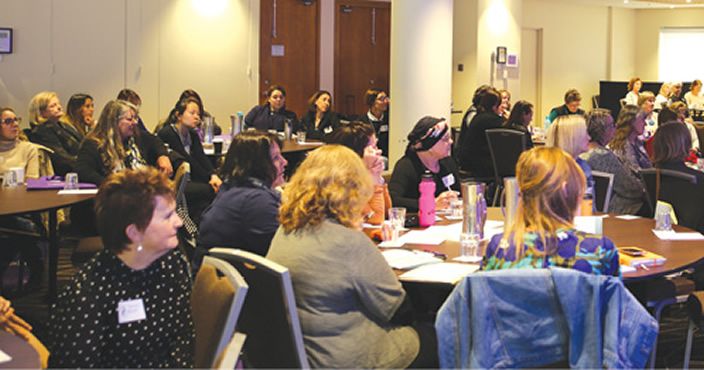
Another inspiring conference
Many of the stories in this issue of Bedrock are derived from presentations at the 2018 IEUA NSW/ACT Branch Early Childhood Conference, held on 8 September. The conference was attended by about 100 teachers and other practitioners, who were inspired and engaged by speakers with an overriding theme: that the pay and respect for early childhood teachers must be improved. Shadow NSW Early Childhood Education Minister Kate Washington attended once again to explain the ALP’s position and receive feedback from teachers on funding issues. For those who could not physically attend the conference, it was live streamed by Teachers Learning Network (TLN).
Free PD for NSW members continues in 2019
During the NSW/ACT IEU Conference, IEUA NSW/ACT Branch Secretary John Quessy announced that the Union would continue to provide free PD for its early childhood members through TLN in 2019.
“We do this for lots of reasons but predominately because you deserve access to high quality PD and you embrace these opportunities,” Quessy said.
Programs are accessible in two formats. Online programs are accessible from home, your workplace or from a mobile device. Log on to a website at the scheduled time and you are welcomed by an online host who will support you throughout the session. TLN identifies high quality and innovative teachers who present the workshop. Topics include working with children with additional needs, promoting pro-social behaviour, building relationships with families and creating inviting play spaces.
Recorded programs are available 24 hours a day, seven days a week. They are ‘on-demand’, so can be completed at a time that meets your needs. They include Nature Play, working with students with ASD, incorporating Aboriginal perspectives and leadership skills. See www.tln.org.au
Qualified teachers talk the talk
Macquarie University researcher Associate Professor Sheila Degotardi has found big differences in the amount of clear, audible adult talk under twos are exposed to in early learning. A quarter of children heard less than 11 words a minute, which could be a risk for their language development. In rooms where there was more interaction between children, teachers and educators, not surprisingly children heard more words. In a room with a university educated teacher, there was more likely to be higher quality interactions.
“It’s not surprising that having a university qualified early childhood teacher as an educational guide, leading the other adults in the room by example, give better results,” Degotardi said.
“Their deep professional knowledge lets them lead their team to establish experiences and use interaction behaviours that enhance language development.”
Full study: https://www.tandfonline.com/doi/full/10.1080/09669760.2018.1479632









































































































































